Pediatric Dentistry
Your Child's First Visit with our Office
We work very hard to ensure each child has a positive experience in our dental office. To help children feel more comfortable, we use silly dental puppets during the appointment. Children like to brush the puppet’s teeth, floss and cuddle with them. We show them educational videos about a Walrus that brushes his teeth and a monkey named Kirby that loves to floss. Each new patient receives a photo frame with a picture of their first dental appointment. We have a family dental office and love to serve the entire family.

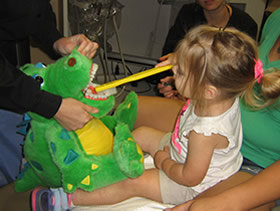
One year "well baby" examination
According to The American Academy of Pediatric Dentistry, your child should have their first dental visit between the ages of 6 and 12 months. During this well-baby dental exam, we look for early dental issues, talk about proper care of your baby's teeth and start to address your child's nutritional needs.
We will examine your baby for signs of decay and other dental problems. Early detection is key; the earlier your child comes in, the sooner we can catch and address any potential problems. We also offer advice and an instructional video on the proper care of your baby's teeth and gums using a soft washcloth or a silicone toothbrush.
A child's first exam is a great time for new parents to ask questions and voice their concerns. We will discuss issues with teething, avoiding cavities, good feeding practices and when to schedule your child's first complete dental exam with X-rays.
We will continue to do a lap exam every six months until your child is ready to sit in the dental chair on his or her own. This usually begins anytime between two and a half to three and a half years old. Our goal is to see your child when they are 12 months old and become their dental home.
Why Early Dental Visits for Children Are Important
Dental appointments for children are important to evaluate the teeth and gums as well as to educate the young patient for a lifetime of good dental hygiene. We will discuss your child's oral health and hygiene,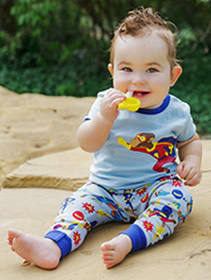 including teething, fluoride, brushing and flossing, cavities, sealants and orthodontics.
including teething, fluoride, brushing and flossing, cavities, sealants and orthodontics.
During a check-up, we evaluate:
- How many teeth are and should be present
- Loose teeth
- Cavities
- Gum health
- Bite and habit evaluation
- Tongue and speech
- Fluoride use
- Nutrition and health history
- Home care and prevention
Preventing Tooth Decay and other Dental Diseases
Tooth decay doesn't discriminate by age. It can affect adults, teens and even your infant or toddler. As parents, it is important we set our children on the path to good oral health. Cavity prevention is a vital part of that.
When food remains on the teeth, it is consumed by bacteria that are naturally present in the mouth. These bacteria convert the food into acid, ultimately contributing to the production of plaque, a sticky substance that clings to the teeth. The acids in plaque will harm the enamel of the tooth, creating cavities.
Tooth decay is a serious problem and can ultimately lead to infection, pain and loss of teeth. Here are a few simple steps you can take to prevent child tooth decay:
Preparing your Child for their Visit
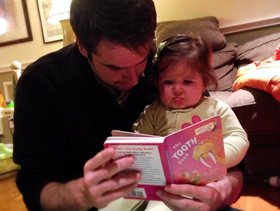 Parents frequently ask what they should tell their child before coming in for the first dental visit. We suggest you prepare your child the same way you might before a first haircut or trip on an airplane.
Parents frequently ask what they should tell their child before coming in for the first dental visit. We suggest you prepare your child the same way you might before a first haircut or trip on an airplane.
To prepare your child for the first visit:
Preventive Care
Tooth decay is not inevitable in children. At our office, we are involved with all aspects of preventive care. We will educate you on proper nutrition at home in order to help prevent tooth decay. We offer the latest sealant treatments to protect your child's teeth from cavities. Sealants are thin plastic coatings that are bonded to the chewing surfaces of decay-prone back teeth. This is just one example of how we can provide a foundation for a lifetime of good oral health.
Cavity Prevention
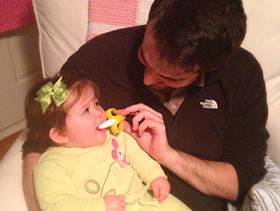 Cavities are most often due to the combination of a processed food and sugar-laden diet along with mom and dad not brushing all of the tooth surfaces thoroughly. Our general rule is that until your child can tie his or her own shoes then mom and dad need to assist with brushing their teeth. Restricting the amount of sugary snacks, processed carbohydrates and sugary or acidic drinks consumed along with brushing at least twice a day will reduce a child's risk of developing cavities.
Cavities are most often due to the combination of a processed food and sugar-laden diet along with mom and dad not brushing all of the tooth surfaces thoroughly. Our general rule is that until your child can tie his or her own shoes then mom and dad need to assist with brushing their teeth. Restricting the amount of sugary snacks, processed carbohydrates and sugary or acidic drinks consumed along with brushing at least twice a day will reduce a child's risk of developing cavities.
Cavities are caused by a buildup of bacteria, food particles and saliva on the teeth that turns into plaque, a film that coats your teeth. Since plaque is acidic, it will attack the tooth enamel and cause decay. Regular brushing helps keep plaque at bay, but decay can often occur in the back teeth, which are harder to clean.
Tips for Cavity Prevention:
Timeline for Teeth
Your child's full set of primary, or "baby," teeth should all appear by the time he or she is 3 years old. The first teeth to erupt are generally the two bottom front teeth, which tend to erupt when a child is 6 to 8 months old. The four upper front teeth usually appear next, and the remaining teeth come in gradually thereafter.
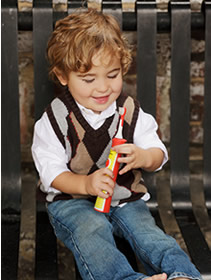 Around the age of 6 years old, most children will begin to lose their baby teeth and permanent teeth start appearing. There are normal variations in the timing of losing teeth, with the process beginning earlier in some children and later in others. By about 21 years old, your child will most likely have all 32 permanent teeth, including the wisdom teeth.
Around the age of 6 years old, most children will begin to lose their baby teeth and permanent teeth start appearing. There are normal variations in the timing of losing teeth, with the process beginning earlier in some children and later in others. By about 21 years old, your child will most likely have all 32 permanent teeth, including the wisdom teeth.
Baby teeth will not remain in the mouth forever, but they are essential. They help children to speak and chew properly. They also retain space for the permanent teeth and affect the shape of the face and overall appearance. When a child develops good oral hygiene habits at a young age, it will benefit both the baby and permanent teeth for the long term.
